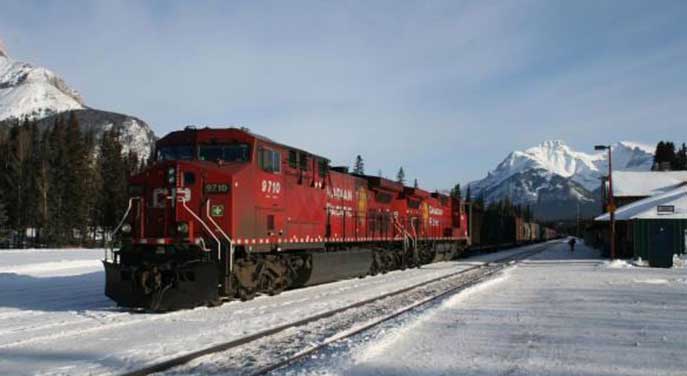 A bidding war erupted recently between Canada’s two mammoth and historic railways, Canadian National (CN) and archrival Canadian Pacific (CP), for the American railroad Kansas City Southern (KCS).
A bidding war erupted recently between Canada’s two mammoth and historic railways, Canadian National (CN) and archrival Canadian Pacific (CP), for the American railroad Kansas City Southern (KCS).
KCS ultimately accepted CN’s US$30-billion bid after scrapping CP’s US$33.6-billion offer.
This is all about KCS’s mid-American location and its extensive network in Mexico, where there’s considerable volume and potential growth in industrial and commodity shipments to and from that developing nation as it modernizes and industrializes.
The potential for Canadian trade with Mexico and the United States is alluring, and both CN and CP’s upper management were willing to pay for it.
A case could be made that the regulatory environment for the railways in Canada makes foreign expansion not only more attractive but necessary to avoid stagnation or decline.
However, as regulated industries go, railroads aren’t oppressed, especially when compared to pipelines, trucking and airlines, all of which are at least partial competitors to rail. The key is that railways own their rights-of-way and, generally, the terminals and access to sea ports.
However, there are limits to how big the railways can grow by just serving Canadian customers or even overseas ones. Lucrative markets such as China, India, Japan, South Korea and the European Union are still attractive but not a cure-all for domestic near-stagnation. China’s population growth is slowing, as is its high-intensity use of commodities from Canada, such as metals, coal, potash, fertilizer and lumber. The other markets are also slow-growth.
So while there’s some room for further sales overseas, there are also some risks as tensions with China rise.
Australia has lost substantial exports to China due to diplomatic spats. Canada isn’t favoured by China and this could worsen. Meanwhile, Canada’s renewed trade deal with the U.S. and Mexico has reinvigorated trade and investment prospects between the three signatories. Railways facilitate the intensification and extension of commercial activity.
Mexico and the U.S. aren’t growing quickly, but both have steady population growth and growing industrial networks are enhancing their development. Mexico is urbanizing and its manufacturing sector is growing, requiring more machinery and equipment, including building materials, pipes, conduit and cable and wire, which are most economically shipped by rail.
In addition, North American firms are conscious that, as tempting a market as China is, overreliance on it in a firm’s supply chain could put it at risk if China takes a dislike to it or its suppliers, or if there’s a trade or political dispute between that increasingly assertive nation and its perceived adversaries.
The U.S. government is dangling subsidies, credits and low-cost financing to ‘sensitive’ industries such as microchip manufacturers to invest in its territory and reduce exposure to China. East Asian firms nervous about putting too much money into a temperamental and possibly hostile China are amenable to such enticements. Taiwan, in particular, is wary of mainland investment.
There will be much more reshoring and onshoring of production and supply to mitigate the risk of running short of goods. In addition, such a move will prevent companies from having to answer awkward questions from politicians or shareholders about why management didn’t prepare for potential disruptions.
As the low-cost manufacturing nation in the North American trio, Mexico stands to gain a lot from avoiding the Beijing bully. More than anything, the geopolitical factors made the KCS takeover sensible.
Ian Madsen is a senior policy analyst at the Frontier Centre for Public Policy.
Ian is a Troy Media contributor. For interview requests, click here.
The views, opinions and positions expressed by columnists and contributors are the authors’ alone. They do not inherently or expressly reflect the views, opinions and/or positions of our publication.
© Troy Media
Troy Media is an editorial content provider to media outlets and its own hosted community news outlets across Canada.



